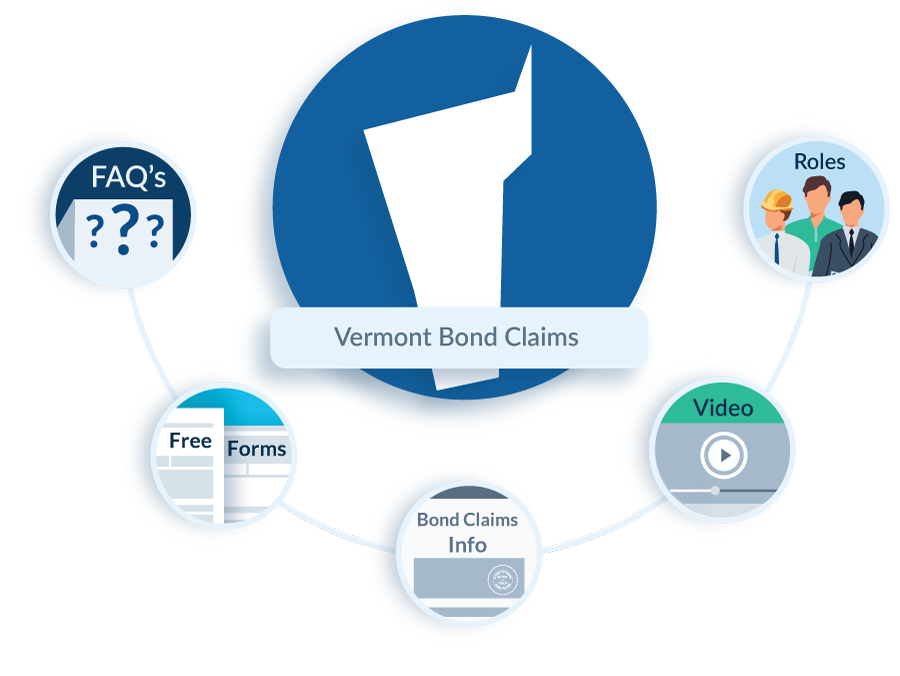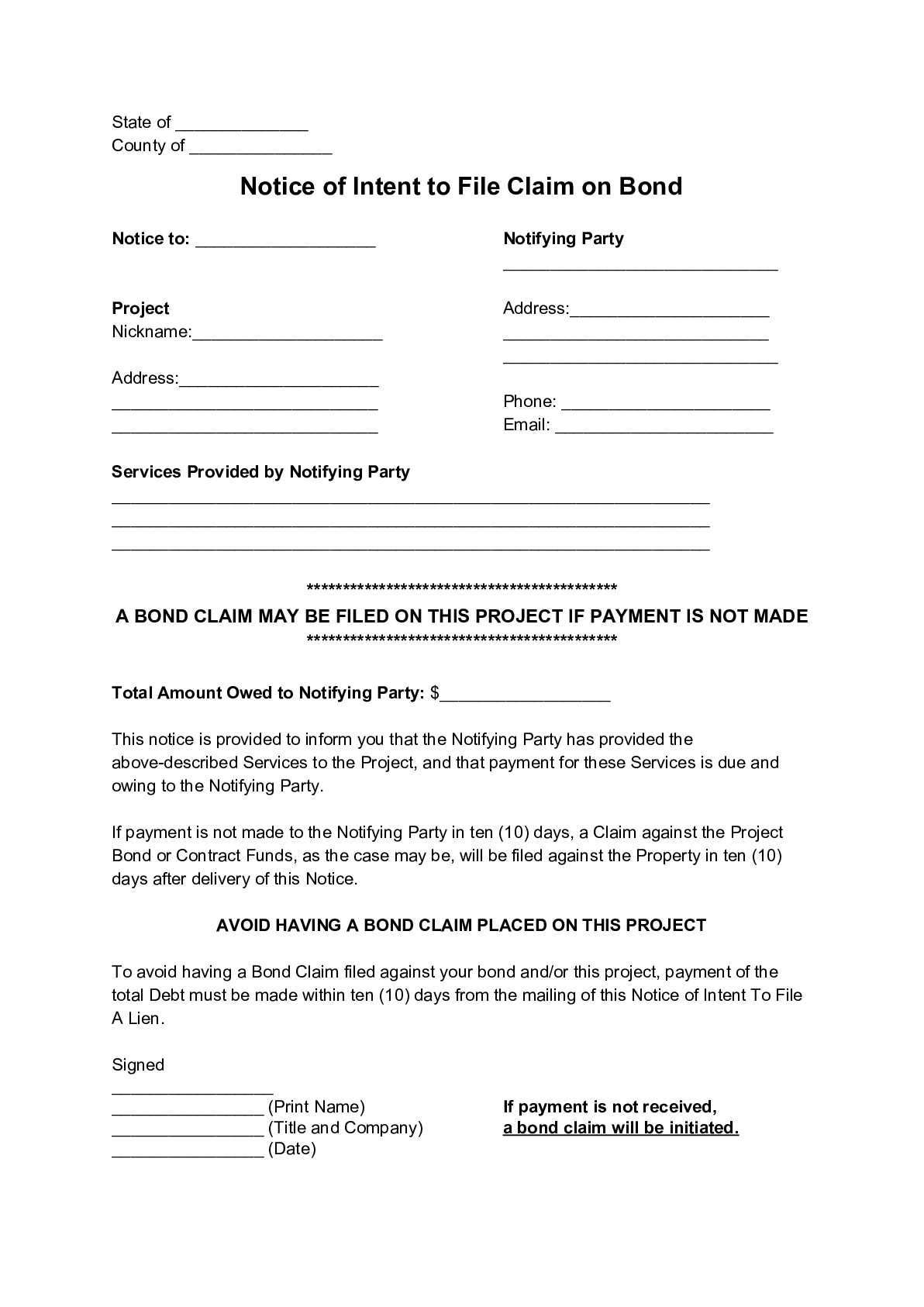Vermont
Preliminary Notice Deadlines
California
Vermont
California
Vermont
Vermont
Claim on bond (or if no bond, on the state directly) due within 90 days from final furnishing of labor and/or materials. Action to enforce claim due within 1 year of last furnishing labor and/or materials.
Vermont
Vermont
Claim on bond (or if no bond, on the state directly) due within 90 days from final furnishing of labor and/or materials. Action to enforce claim due within 1 year of last furnishing labor and/or materials.
In Vermont, there is no specific provision of the law related to providing protection on public projects other than state highway projects. Because of that, on all projects other than state highway projects the terms of the bond itself (if a bond is provided) will control who is allowed to make a claim. On highway projects, the protection in Vermont is broad and includes laborers and suppliers of “material, merchandise, labor, rent, hire of vehicles, power shovels, rollers, concrete mixers, tools and other appliances, professional services, premiums and other services used or employed in carrying out the terms of the contract between the contractor and the state of Vermont.”


Highway Projects: The bond claim must be filed with the Secretary of Transportation within 90 days after acceptance of the completed project by the State of Vermont.
All Other Projects: Terms of the bond control.


Highway Projects: The bond claim must be given to the Secretary of Transportation. While not required, it may be best practice to also send the bond claim to the general contractor, and the surety (if known).
All Other Projects: Terms of the bond control.


Highway Projects: A suit to enforce the bond claim must be initiated within 1 year one year after the claim is filed with the secretary of transportation.
All Other Projects: Terms of the bond control.


Highway Projects: The bond claim is only required to contain a sworn statement of the claim. It may be best practice to also include a description of the project, and the labor and/or materials provided, and to identify the general contractor and hiring party.
All Other Projects: Terms of the bond control.


Highway Projects: The bond claim must be filed with the Secretary of Transportation.
All Other Projects: Terms of the bond control.




A Notice of Intent to Make Bond Claim is not a required document, but it can be a powerful one. By sending this notice, a claimant...
When you perform work on a state construction project in Vermont, and are not paid, you can file a “lien” against the project pursuant to Vermont’s Little Miller Act. Since the claim is not against the state or county’s actual property, but instead against a posted bond, the claim is not really called a “lien” but is more frequently referred to as a “bond claim” or “little miller act claim.” Vermont’s Little Miller Act is found in Vermont Statutes, Title 19, Chapter 1, and is reproduced below.
The Agency shall, except where otherwise specifically provided by law:
(1) Award contracts on terms as it deems to be in the best interest of the state, for the construction, repair, or maintenance of transportation related facilities; for the use of any machinery or equipment either with or without operators or drivers; for the operation, repair, maintenance, or storage of any state-owned machinery or equipment; for professional engineering services, inspection of work or materials, diving services, mapping services, photographic services, including aerial photography or surveys, and any other services, with or without equipment, in connection with the planning, construction, and maintenance of transportation facilities. Persons rendering these services shall not be within the classified service, and the services shall not entitle the provider to rights under any state retirement system. Notwithstanding chapter 13 of Title 3, the Agency may contract for services also provided by persons in the classified service, either at present or at some time in the past. The solicitation and award of contracts by the Agency shall follow procurement standards approved by the Secretary of Administration as well as applicable federal laws and regulations.
(2) Control and direct the use and expenditures of all moneys appropriated by the state for transportation purposes, and prepare and use a budget for these expenditures.
(3) Exercise general supervision of all transportation functions, have the right to direct traffic on all State highways which are under construction and maintenance, and may close all or any part of a State highway which is under construction or repair. The Agency shall maintain detours comprising State or town highways, or both, around planned closures of State highways in excess of 72 hours. If the Agency maintains a detour on a town highway, it shall be responsible for repairing any damage to the town highway caused by the detoured traffic.
(4) Cause necessary surveys, maps, plans, specifications, and estimates to be made for the improvement, construction, and maintenance of transportation facilities.
(5) Furnish technical and engineering assistance when requested, at cost, if available, to the various municipalities of the state.
(6) Advise town officers as to the construction, improvement, and maintenance of town highways, when requested.
(7) Erect and maintain appropriate traffic control devices on state highways.
(8) Require any contractor or contractors, employed in any project of the Agency for construction of a transportation improvement, to file in the office of the Secretary a good and sufficient surety bond to the State of Vermont, executed by a surety company authorized to transact business in this state in such sum as the Agency shall direct, conditioned for the compliance by the contractor or contractors and their agents and servants, with all matters and things set forth and specified to be by the principal kept, done and performed at the time and in the manner in the contract between the Agency and the contractor or contractors specified, and to pay over, make good and reimburse the State of Vermont, for all loss or losses and damage or damages which the State of Vermont may sustain by reason of failure or default on the part of the contractor or contractors. The Agency is authorized to require any other condition in the bond that may from time to time be necessary. The Secretary at his or her discretion as to the best interest of the state, may accept other good and sufficient surety in lieu of a bond and, in cases involving contracts for $100,000.00 or less, may waive the requirement of a performance bond.
(9) Require any contractor or contractors employed in any project of the Agency for construction of a transportation improvement to file an additional surety bond to the Secretary and his or her successor in office, for the benefit of labor, materialmen, and others, executed by a surety company authorized to transact business in this state, in such sum as the Agency shall direct, conditioned for the payment, settlement, liquidation, and discharge of the claims of all creditors for material, merchandise, labor, rent, hire of vehicles, power shovels, rollers, concrete mixers, tools, and other appliances, professional services, premiums, and other services used or employed in carrying out the terms of the contract between the contractor and the State of Vermont and further conditioned for the payment of taxes both state and municipal, and contributions to the Vermont Commissioner of Labor, accruing during the term of performance of the contract. However, in order to obtain the benefit of the security, the claimant shall file with the Secretary a sworn statement of his or her claim, within 90 days after the final acceptance of the project by the State of Vermont or within 90 days from the time the taxes or contributions to the Vermont Commissioner of Labor are due and payable, and, within one year after the filing of the claim, shall bring a petition in the superior court in the name of the Secretary, with notice and summons to the principal, surety, and the Secretary, to enforce the claim or intervene in a petition already filed. The Secretary at his or her discretion as to the best interest of the state, may accept other good and sufficient surety in lieu of a bond.
(10) Purchase, rent, lease, operate, and maintain the machinery, trucks, and equipment necessary to carry out the provisions of this title and in its discretion let trucks and other machinery under such terms as it determines.
(11) With the approval of the Governor, purchase, rent, lease, or erect suitable garages and other buildings as may be necessary for the care of its machinery, trucks, materials, and equipment.
(12) Consult with the Agency of Natural Resources prior to engaging in road repairs or construction which in any way involve streams, ponds, or lakes.
(13) Furnish, subject to reimbursement and upon request by a municipality, services as may be necessary for the municipality to comply with the “Uniform Relocation Assistance and Real Property Acquisition Policies Act of 1970”1 or any subsequent amendments to the Act.
(14) With respect to state highways, have the same powers that select board have with respect to town highways.
(15) Respond in writing to concerns raised during transportation board hearings conducted pursuant to the provisions of sections 5(d)(6) and 10g(d) of this title.
(16) Inform the Joint Transportation Oversight Committee of any anticipated loss or reduction of federal funding for transportation purposes due to either a lack of state funds for matching, or a decrease in federal funds for the one-year capital program. Back to Top

